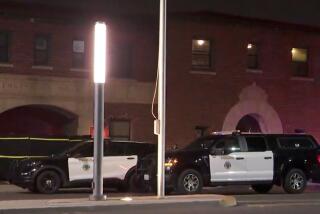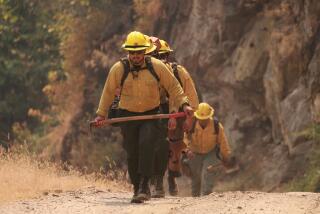Firefighters May Risk Their Future Health, Study Says
SEATTLE — Physically fit men and women who risk their lives by entering burning buildings to battle flames may also be risking their future health, medical researchers report.
A study by researchers at Harborview Medical Center, requested by the Firefighter’s Pension Board of Seattle, shows that firefighters under the age of 40 are 60% more likely to die of cancer, primarily in the lymph tissue and brain, than are other Americans.
“Firefighters were found to have lower death rates than the general U.S. population for non-malignant causes of death, like heart disease, but higher overall rates of cancer,” said Dr. Linda Rosenstock, chief investigator of the study and director of the Harborview Occupational Medicine Program.
Rosenstock said the study involved identifying all individuals--totaling 4,450--from Seattle, Tacoma, Bellevue, Kent and Portland who worked as firefighters for at least one year between 1945-1980. They discovered 889 of those firefighters had died and 191 of the deaths were due to cancer.
‘Long-Term Effects’
“This finding was based on small numbers and requires further investigation, but it suggests that injuries to the lungs, like smoke inhalation, may have long-term negative effects,” she said.
The team of Harborview researchers will continue over the next three years studying data on the firefighters through the year 1987 with a grant from the Federal Emergency Management Agency.
“This study is unique in that it covers a more recent time period and because we compare firefighters with police officers, as well as the general population,” Rosenstock said.
To fireman James A. Fosso the statistics are shocking because he began fighting fires 18 years ago when self-contained breathing apparatus was not used.
“I just copied the veteran firefighters . . . our concern was to get in and out and sometimes that required crawling and breathing the air on the floor of the burning building,” Fosso said, who now fights fires in downtown Seattle. “I was only 22 then. I don’t recall worrying about fumes. It was just part of the job.”
Early Firefighting Days
Fosso recalled that in his early days of firefighting he would blow black mucus from his nose or would smell of smoke the day after a fire because his skin was excreting the smoke byproducts.
One of the questions Rosenstock and other researchers are studying is how cancer in firefighters is related to the intake of fumes from synthetic materials used in building construction since World War II.
Rosenstock said the noxious byproducts have already been proven to produce cancer in other populations.
Claude Harris, who became chief of Seattle’s 1,000 firefighters 2 1/2 years ago, has made self-contained breathing apparatus mandatory, noting it is the only protection firefighters have against toxic vapors and noxious gases.
“It used to be that the leather-lunged men didn’t wear the apparatus because it wasn’t macho, but it is not considered macho anymore not to wear the equipment,” said Harris, who has been with the department 29 years.
Firefighter Died
Firefighter Robert Earhart died from contact with toxic fumes last July after his tank ran out of air while he was battling a blaze in a vacant apartment complex. The tanks, which vary in weight from 20 to 35 pounds, provide only about 30 minutes of air.
Fosso said firefighters have confidence in the breathing apparatus, but improvements are always needed--especially in the equipment’s weight and the communication device inside the mask. The National Fire Protection Assn. regularly tightens its voluntary regulations on equipment used by firefighters, said George Blank, a spokesman for Survivair, a fire equipment manufacturer in Santa Ana. The company has been producing equipment for 25 years and its improvements in the breathing apparatus have come in response to national studies demonstrating that firefighters need full protection, Blank said.
As executive secretary of the Seattle Firefighters Union, Local 27, Fosso said the group is concerned about the high number of cancer cases and are working with the departments in cautioning firefighters to be conscientious about the hazards of firefighting.
“We deal with cancer patients every day through our Medic One (emergency medical) service and we see cancer killing and it scares us,” he said.
More to Read
Sign up for Essential California
The most important California stories and recommendations in your inbox every morning.
You may occasionally receive promotional content from the Los Angeles Times.










